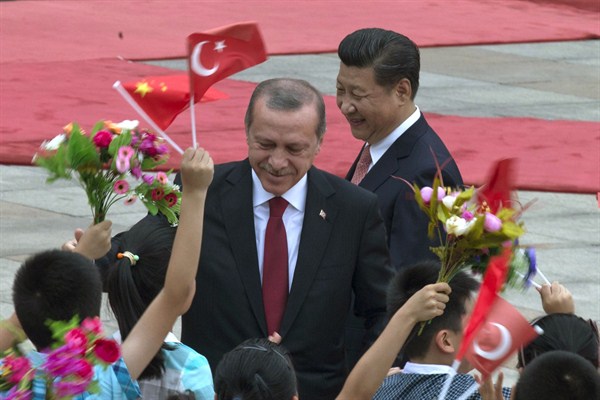In late July, Turkish President Recep Tayyip Erdogan was in Beijing, his first state visit to China as president. Weeks earlier, back in Istanbul, Turkish nationalists enraged at the treatment of Uighurs in China’s Xinjiang province had attacked Korean tourists, thinking they were Chinese, and stormed the Thai Consulate after Thailand deported a group of Uighurs who had fled China. With Erdogan pushing a more nationalist agenda to overcome a challenge from the right after his party’s electoral setbacks in June, most observers focused on whether China’s ethnic tensions and Turkish criticism of Beijing’s policies toward the Uighur minority could upset China-Turkey ties.
Once in Beijing, however, Erdogan reiterated Turkey’s opposition to terrorism by the East Turkestan Islamic Movement, which China blames for violence in Xinjiang, but which Uighur activists say is a scapegoat. That shouldn’t have been a surprise. It is true that modern Turkey was founded on a pan-Turkic nationalism that places Turks at the head of a family stretching east from Anatolia all the way to Xinjiang province, encapsulating not only Uighurs but also Tatars, Azeris, Uzbeks, Kazakhs, Kyrgyz and sundry smaller groups. That ideology still has its adherents, especially among the ultranationalist supporters of Turkey’s Nationalist Movement Party (MHP) and its more radical splinters. But it is more a cliché of Turkish political rhetoric than a policy commitment, much less a burgeoning popular movement.
Erdogan’s willingness to set aside Turkic allegiances in favor of smooth ties with Beijing should have been expected, given the priority he places on economic links with China, however one-sided they have been. After all, Turkey has done nothing to support the Crimean Tatars since Russia’s annexation of Crimea last year—even as their leader Mustafa Dzhemilev was forced into exile, their media shuttered and reports of forced disappearances by Russian security services multiplied.

